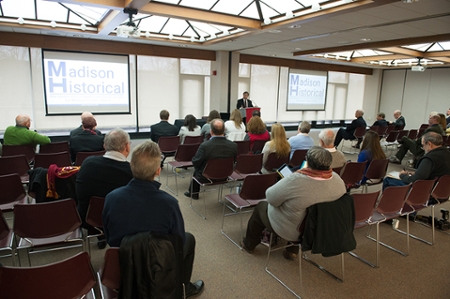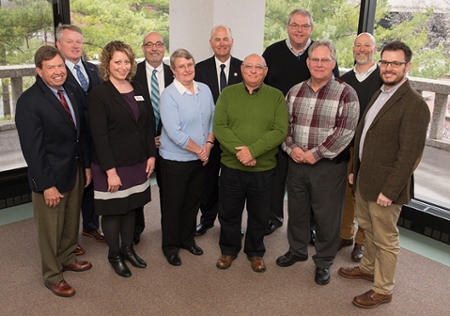 Southern Illinois University Edwardsville hosted a launch event for Madison Historical: The Online Encyclopedia and Digital Archive for Madison County, Ill. on Tuesday, March 14. The innovative digital repository features the rich history of Madison County and invites the public to be content producers.
Southern Illinois University Edwardsville hosted a launch event for Madison Historical: The Online Encyclopedia and Digital Archive for Madison County, Ill. on Tuesday, March 14. The innovative digital repository features the rich history of Madison County and invites the public to be content producers.
“The last recorded history ended in 1912, and that is a long period of time during which so much has happened in this county and the region that could quickly be forgotten,” said Madison County Regional Superintendent of Schools Robert Daiber, EdD, who originated the idea. “This is going to be a phenomenal product and ready reference for the next generation seeking to learn about what happened during the 20th century in Madison County.”
Madison Historical is being developed and managed by SIUE College of Arts and Sciences’ (CAS) Department of Historical Studies associate professors Jeffrey Manuel, PhD, and Jason Stacy, PhD, Stephen Hansen, PhD, faculty emeritus and former interim chancellor, along with undergraduate and graduate students, and an alumnus.
During the event, SIUE Chancellor Randy Pembrook emphasized his support of the project, which aligns directly with the University’s commitment to high impact community engagement practices (HICEPs).
“What an amazing period of time this was, both for our county and the country as a whole,” Pembrook said. “HICEPs allow us to take students who are developing knowledge in a certain area, combine them with faculty who have expertise in a particular subject matter, and further complimenting the collaboration by including individuals from the community who have an excitement or passion for a topic, in this case Madison County history.”
CAS Dean Greg Budzban, PhD, led the event that offered an introduction to the innovative project and an opportunity to interact with the digital materials. Budzban emphasized that Madison Historical places SIUE at the national forefront with the potential to serve as a template for communities around the country.
“This project aims to preserve the critical local history of the people, places and events that created the very fabric of our lives,” said Buzban. “Madison Historical embodies a new type of scholarship, the digital humanities, which is a welding of technology and the traditional humanities, in a way that is extremely exciting.
 “The richness of the structure of the archival materials and the ability to interact with them in fundamental ways completely changes our relationship with the information and the history itself.”
“The richness of the structure of the archival materials and the ability to interact with them in fundamental ways completely changes our relationship with the information and the history itself.”
The Madison Historical team offered attendees a visual tour and lesson on the site’s functions, emphasizing its interactive and complimentary nature with partner historical institutions throughout the county.
“Madison County’s fascinating history is deeply representative of a lot of the major changes that have occurred in Illinois and nationwide in the 20th century,” Manuel said.
“We hope to provide a flexible structure where users can move in and out of an article or an archive, follow their own inclinations via informational tags, and ultimately, find themselves going to the historical institutions in Madison County to see the items themselves,” Stacy added. “In that regard, we hope to function as a visible hub and provide an articulation between online and brick and mortar historical institutions throughout the county.”
Madison Historical features themes of government, industry, education, law and culture, with accessible and authoritative content in such forms as:
- Encyclopedia articles on significant people, places and events in the county
- Oral history interviews, including audio recordings and complete transcripts, with a wide range of people who have lived in Madison County and played a role in shaping its history
- Historical items such as photographs, letters or documents that can be scanned and uploaded to the digital archive
Madison Historical also strives to become an effective educational tool for K-12 teachers that provides opportunities for students to get involved and excited about research.
“This summer, the Department of Historical Studies is offering an online version of its public history course where we will train area teachers to research and write encyclopedia articles, conduct oral histories, and collect digital images of historical artifacts,” Stacy explained. “We hope they will use these skills not only to contribute to Madison Historical, but also to encourage their students to contribute to the site by training them in the skills of digital archiving, research and historical writing.”
“The project brings together members of our community, students and scholars in a collaboration to collect, preserve and write our own history,” added Hansen. “It makes history accessible for everyone, and because it will inform us about ourselves, who we were and who we are, it is a history of ‘Everyman,’ the people of Madison County.”
For more information on how to contribute ideas or materials, or become a content producer, email the team at madisonhistorical1812@gmail.com.
For a complete list of partner institutions and the network of sponsors who have supported Madison Historical, including the Madison County Regional Office of Education, Madison County Government, Phillips 66 and attorney John Simmons, visit Madison-Historical.siue.edu/.
Photo: SIUE Chancellor Randy Pembrook shares his excitement and support of Madison Historical during the innovative digital archive’s launch event.
(L-R) Dr. Stephen Hansen, John Simmons, chairman of Simmons Hanley Conroy Law Firm, Megan Allen with Phillips 66, CAS Dean Dr. Greg Budzban, Mary Westerhold with the Madison County Historical Society, Madison County Regional Superintendent of Schools Dr. Robert Daiber, Madison County Board Member Nick Petrillo, Superintendent of East Alton-Wood River District 14 Dr. John Pearson, Granite City Mayor Ed Hagnauer, Dr. Jason Stacy, and Dr. Jeffrey Manuel.